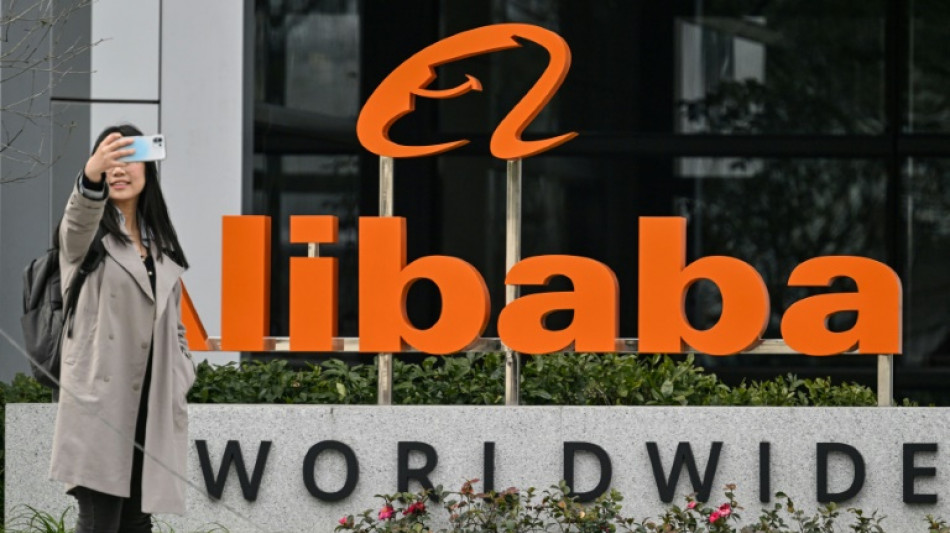
-
 Tarnished image and cheating claims in Malaysia football scandal
Tarnished image and cheating claims in Malaysia football scandal
-
Family affair as Rinderknech joins Vacherot in Shanghai quarters

-
 New documentary shows life in Gaza for AFP journalists
New documentary shows life in Gaza for AFP journalists
-
Tennis stars suffer, wilt and quit in 'brutal' China heat

-
 Wildlife flee as floods swamp Indian parks
Wildlife flee as floods swamp Indian parks
-
Record flooding hits Vietnam city, eight killed in north

-
 Battling cancer made Vendee Globe win 'more complicated', says skipper Dalin
Battling cancer made Vendee Globe win 'more complicated', says skipper Dalin
-
England, Portugal, Norway closing in on 2026 World Cup

-
 Child protection vs privacy: decision time for EU
Child protection vs privacy: decision time for EU
-
Bear injures two in Japan supermarket, man killed in separate attack

-
 In Simandou mountains, Guinea prepares to cash in on iron ore
In Simandou mountains, Guinea prepares to cash in on iron ore
-
Morikawa says not to blame for 'rude' Ryder Cup fans

-
 Far right harvests votes as climate rules roil rural Spain
Far right harvests votes as climate rules roil rural Spain
-
'Return to elegance': highlights from Paris Fashion Week

-
 Britain's storied Conservative party faces uncertain future
Britain's storied Conservative party faces uncertain future
-
New Zealand's seas warming faster than global average: report

-
 Snakebite surge as Bangladesh hit by record rains
Snakebite surge as Bangladesh hit by record rains
-
Yankees deny Blue Jays playoff sweep as Mariners beat Tigers

-
 Australia police foil 'kill team' gang hit near daycare centre
Australia police foil 'kill team' gang hit near daycare centre
-
US, Qatar, Turkey to join third day of Gaza peace talks in Egypt

-
 Gold tops $4,000 for first time as traders pile into safe haven
Gold tops $4,000 for first time as traders pile into safe haven
-
Indian garment exporters reel under US tariffs

-
 NBA back in China after six-year absence sparked by democracy tweet
NBA back in China after six-year absence sparked by democracy tweet
-
Energy storage and new materials eyed for chemistry Nobel

-
 Trump unlikely to win Nobel Peace Prize, but who will?
Trump unlikely to win Nobel Peace Prize, but who will?
-
Qatar, Turkey to join third day of Gaza peace talks in Egypt

-
 Study finds women have higher genetic risk of depression
Study finds women have higher genetic risk of depression
-
Dolly Parton's sister calls for fan prayers over health issues

-
 On Trump's orders, 200 troops from Texas arrive in Illinois
On Trump's orders, 200 troops from Texas arrive in Illinois
-
Two bodies found, two missing after Madrid building collapse

-
 Panthers raise banner as NHL three-peat bid opens with win
Panthers raise banner as NHL three-peat bid opens with win
-
Nobel physics laureate says Trump cuts will 'cripple' US research

-
 UFC star McGregor suspended 18 months over missed drug tests
UFC star McGregor suspended 18 months over missed drug tests
-
Trump talks up Canada trade deal chances with 'world-class' Carney

-
 Ecuador president unharmed after apparent gun attack on motorcade
Ecuador president unharmed after apparent gun attack on motorcade
-
Lyon exact revenge on Arsenal, Barca thrash Bayern in women's Champions League

-
 Trump says 'real chance' to end Gaza war as Israel marks attacks anniversary
Trump says 'real chance' to end Gaza war as Israel marks attacks anniversary
-
Gerrard brands failed England generation 'egotistical losers'

-
 NFL fines Cowboys owner Jones $250,000 over gesture to fans
NFL fines Cowboys owner Jones $250,000 over gesture to fans
-
Bengals sign veteran quarterback Flacco after Burrow injury

-
 New prime minister inspires little hope in protest-hit Madagascar
New prime minister inspires little hope in protest-hit Madagascar
-
Is Trump planning something big against Venezuela's Maduro?

-
 EU wants to crack down on 'conversion therapy'
EU wants to crack down on 'conversion therapy'
-
French sex offender Pelicot says man who abused ex-wife knew she was asleep

-
 Trump says 'real chance' to end Gaza war as Israel marks Oct 7 anniversary
Trump says 'real chance' to end Gaza war as Israel marks Oct 7 anniversary
-
UK prosecutors to appeal dropped 'terrorism' case against Kneecap rapper

-
 Spain, Inter Miami star Alba retiring at end of season
Spain, Inter Miami star Alba retiring at end of season
-
EU targets foreign steel to rescue struggling sector

-
 Trump talks up Canada deal chances with visiting PM
Trump talks up Canada deal chances with visiting PM
-
Knight rides her luck as England survive Bangladesh scare


China's Alibaba posts annual revenue increase despite spending slump
Internet giant Alibaba posted on Thursday a six percent increase in annual revenue, the latest positive sign for China's tech sector despite persisting economic uncertainties that include sluggish spending and threatened trade.
The Hangzhou-based company is one of the biggest players in China's tech industry, with operations spanning retail, digital payment, artificial intelligence and entertainment.
This year has seen its share price rollercoaster on a wave of investor enthusiasm about Chinese AI capabilities that began in January, followed by a steep drop last month triggered by US President Donald Trump's global tariff blitz.
The firm's revenue during the fiscal year ended March 31 totalled 996.3 billion yuan ($138.2 billion), according to results posted to the Hong Kong Stock Exchange, up six percent from the previous 12-month period.
Net income attributable to ordinary shareholders rose to 129.5 billion yuan, the statement showed, a jump of 62 percent year-on-year according to AFP calculations.
In the final quarter alone, Alibaba saw revenue of 236.5 billion yuan, narrowly coming up short of a Bloomberg forecast.
Net income attributable to ordinary shareholders during the quarter reached 12.4 billion yuan, surging 279 percent from the low base of 3.3 billion yuan recorded during the same period last year.
"Our results this quarter and for the full fiscal year demonstrate the ongoing effectiveness of our 'user first, AI-driven' strategy, with core business growth continuing to accelerate," CEO Eddie Wu said in a statement.
The growth is another positive sign for China's tech sector, which has garnered revamped interest from investors since the shock release in January of advanced AI chatbot DeepSeek -- apparently developed at a fraction of the cost thought necessary.
Alibaba and fellow tech giants Tencent and Baidu are now funnelling large sums into a new race to develop and integrate the most cutting-edge AI applications.
- Spending slump -
As the Chinese economy strains under sluggish spending and a tumultuous trade relationship with the United States, Beijing is increasingly looking to platforms operated by domestic internet giants as a cushion for employment and consumption.
Prospects improved Monday when Beijing and Washington announced plans to significantly scale back sky-high tariffs that had severely threatened trade between the two nations.
However, economists say that the Chinese economy may still struggle to achieve the official growth target set by leaders of around five percent this year.
Alibaba's announcement on Thursday came after Tencent and e-commerce giant JD.com posted moderate increases in first-quarter revenue earlier this week, indicating a possible rebound in spending.
But official figures released on Saturday showed that consumer prices remained mired in a slump last month, reflecting continued deflationary pressure.
Alibaba was once a key subject of the aggressive regulatory crackdown launched in late 2020 on the domestic tech sector, attributed to worries in Beijing that top firms had become too powerful.
Jack Ma, the firm's charismatic co-founder who had spoken boldly about the shortcomings of China's financial and regulatory system, kept a low profile during the lengthy campaign.
He reappeared in February during a meeting with President Xi Jinping and other business luminaries -- a shock development that suggested a warmer stance from Beijing and sent Alibaba stocks soaring.
Ma is no longer an executive at Alibaba but is believed to retain a significant shareholding in the company.
R.Fischer--VB
